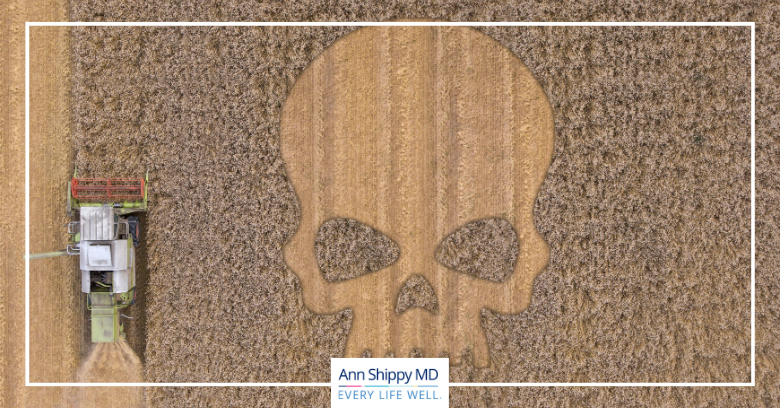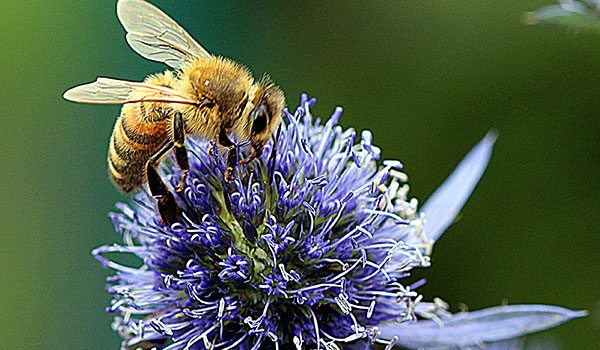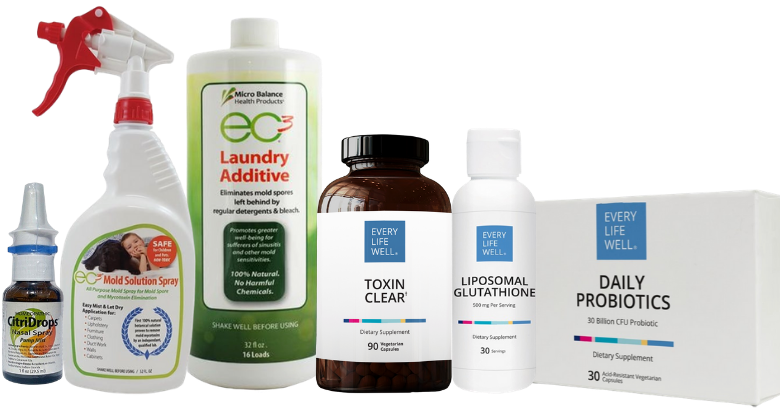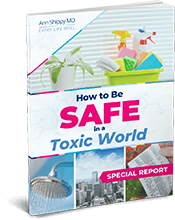Glyphosate Update
Glyphosate, the toxic herbicide found in Roundup, is in the news again. And the news isn’t good.
Today’s article will dive into some new research about how pervasive glyphosate is, how it’s showing up in urine samples across the country, and how it is contributing to declining levels of essential pollinators.
Keep reading to learn more about:
- What is glyphosate?
- How glyphosate affects human health
- New CDC data looking at glyphosate levels in urine
- How glyphosate affects bee populations
- Possible good news about glyphosate (although it’s not enough)
- Action steps you can take to limit your exposure
Glyphosate Review
Glyphosate (N-(phosphonomethyl) glycine) was first introduced in the 1970s as a broad-spectrum herbicide that deactivates certain enzymes in plants, so they die. It is used as a weed killer by individuals and municipalities.
If you see someone spraying chemicals on sidewalk cracks or in rocky landscaping, it’s probably a Roundup product containing glyphosate.
Glyphosate is also the most used herbicide in the agricultural industry.
Its use goes together with genetically modified (GMO) crops that were introduced in the 1990s. In these crops, including corn, soybeans, canola, and cotton, the seeds have been genetically altered to resist glyphosate.
That way, farmers can spray an entire field with Roundup, killing all the weeds but leaving the crop behind.
In practice, it doesn’t work quite as advertised.
The levels of Roundup needed on crops continue to rise as plants become resistant to its effects.
Learn more about glyphosate and its history of use in our previous article on glyphosate and carcinogens.
Glyphosate And Health
As glyphosate in the environment and the food supply continue to increase, we continue to learn more about how it affects human health.
Glyphosate is strongly linked to cancer.
As it breaks down in the environment, it is toxic to microorganisms, plants, insects, animals, and humans. In 2015, the World Health Organization (WHO) classified glyphosate as “probably carcinogenic to humans.”
Widespread glyphosate use may be driving bacteria to become glyphosate-resistant, which could change the human microbiome and the microbiomes of other organisms (see bees below).
This might lead to antibiotic resistance and new pathogens.
Humans are exposed to glyphosate:
- In the air, as the chemical as it’s being sprayed and carried by the wind, we breathe it in
- In the soil, we may step on sprayed areas and carry the chemical into our home via our shoes
- In the water, glyphosate enters the water supply and we drink it
- In the food we eat
Even if we aren’t using glyphosate ourselves or live in an area where glyphosate is banned, we may be exposed through the diet.
Processed foods, including those that contain wheat, oats, corn, soy, canola, and beans, often contain high levels of glyphosate.
Levels will be higher in non-organic foods where glyphosate is used directly on crops.
These foods aren’t required to be tested or labeled for contamination.
Many of the high glyphosate food products are marketed toward children, who are more susceptible to the effects of toxins.
In 2018, tests commissioned by the Environmental Working Group detected glyphosate in 100% of products tested, including popular kids’ foods like oatmeal, breakfast cereal, granola, and snack bars.
Glyphosate Detected In Urine – New Data From The CDC
A recent 2022 study published by the Centers for Disease Control (CDC) found glyphosate in the urine of over 80% of Americans over the age of 6.
When looking at children specifically, the number jumps to 87%.
The study analyzed 2310 urine samples from 2013-2014 as part of the National Health and Nutrition Examination Survey data.
While research has documented glyphosate in urine for years correlated with cancer and other health concerns, this is the first data coming from the CDC.
The data highlights the risks that we all face, especially children, where glyphosate in food is the main route of exposure.
Glyphosate And Bees
One of the significant concerns with pesticides and herbicides is how they affect essential populations of pollinators that we rely on for all the food we eat.
The biodiversity of insects is already decreasing, threatening our ecosystems and food supply.
One important pollinator is bumblebee colonies.
These colonies maintain high temperatures through thermogenesis for their brood’s health. (A brood includes the bee eggs, larvae, and pupae).
The maintenance of temperature is essential for reproduction and hives producing healthy bees. Glyphosate kills plants which lowers resources that bees have access to.
A new study in 2022 looked at the stress placed on colonies due to glyphosate.
When colonies are stressed in this way, it leads to lower brood temperatures, and slower developing bees or bees that don’t develop at all. In essence, glyphosate endangers the reproductive capacity of bees.
In possibly related bee news, researchers have sequenced the genome of wild carpenter bees. These bees are solitary bees that burrow into wood to lay eggs compared to social bees like honeybees and bumblebees that live and reproduce in hives.
Researchers have discovered that the local environment shapes carpenter bees’ gut microbiome.
Microbiomes predictably differ between populations. For example, healthy populations contain Lactobacillus species that support immunity, nutrient uptake, and genetic expression.
In cities, or where these bees may have more stress (and possibly be exposed to more toxins), the microbiome shifts, or there is no Lactobacillus at all.
Good News About Glyphosate?
In July of 2021, Bayer, the company that bought Roundup from Monsanto, released its intent to reformulate Roundup to no longer contain the active ingredient glyphosate. It plans to phase out glyphosate in products available for residential use by 2023.
Bayer maintains that the reason behind this phase-out doesn’t have anything to do with health concerns; however, Bayer has faced more than 125,000 lawsuits from individuals claiming that glyphosate was a factor in their cancer.
So far the company has settled 75% of cases and paid out over $10 billion, but still faces more cases and likely more settlement fees.
While this initially seems like good news, more must be done.
Glyphosate is still used in the agricultural sector in record high amounts. It’s showing up in the food we eat and in our bodies.
In addition, we don’t know what chemicals will replace glyphosate for residential use and other ingredients in the Roundup formula are toxic.
As we’ve seen companies tout BPA-free while replacing BPA with equally harmful chemicals, we must be cautious of corporate greenwashing.
The herbicide industry has a history of shady practices.
They claim the safety of glyphosate to influence the government and consumers, while selling more every year.
Siding with industry, the US Environmental Protection Agency (EPA) still maintains that glyphosate poses no risk to humans or the environment.
However, this is being challenged in court given the overwhelming and mounting evidence about the harms of glyphosate.
What Can We Do?
In our previous article on glyphosate, we outlined important steps to take to reduce the glyphosate exposures you can control.
One of the most important steps is being aware and mindful of the food you and your kids eat. Choose whole, unprocessed organic food.
Switching from conventional to organic food rapidly decreases the amount of glyphosate in the body.
Filtering your drinking and cooking water helps too.
Beyond food, consider working with a Functional Medicine doctor to optimize your detoxification pathways and microbiome.
Here are a few more lifestyle tips to lower personal exposure given new research and emerging data:
- Pull weeds by hand. It’s great to be outside, move your body, and create a beautiful landscape around your home. If you prefer to use a spray, try something natural like a mixture of vinegar, salt, and dish soap as a natural and safe herbicide. Remember that even when glyphosate is removed from Roundup, chemical herbicides are still toxic.
- Plant flowers. Take the stress off bees and other pollinators by providing them with much-needed chemical-free habitat. Planting flowers on your porch or a small garden plot with pollinator-friendly blooms is a helpful place to start.
- Take your shoes off at home. Create a family habit of removing shoes inside and ask your guests to do the same. This easy habit prevents tracking glyphosate and other toxins inside. Children are particularly susceptible to toxins as they spend more time playing on the floor.
- Get involved. Advocate for banning glyphosate for all uses, including agricultural use to keep this toxin out of the environment and our food supply. Vote for leaders with a strong environmental ethic that side with health instead of industry profit.
Glyphosate has made a lot of money for Monsanto (Bayer), but it’s becoming clear just how high the costs are.
Declining bee populations, rising levels of toxins in food, and more people developing cancer should be evidence enough to ban glyphosate for good.
In the meantime, protect yourself by controlling the exposures that you can.
If you are interested in learning more about Glyphosate, watch my video below…
Why Glyphosate Is Dangerous: Interview with Daniele Mandrioli MD
References:
- https://pubmed.ncbi.nlm.nih.gov/29117584/
- https://www.ewg.org/news-insights/news/dear-food-manufacturers-stop-polluting-children-glyphosate
- https://www.ewg.org/news-insights/news-release/2018/10/roundup-breakfast-part-2-new-tests-weed-killer-found-all-kids
- https://wwwn.cdc.gov/Nchs/Nhanes/2013-2014/SSGLYP_H.htm
- https://www.theguardian.com/us-news/2022/jul/09/weedkiller-glyphosate-cdc-study-urine-samples
- https://www.ncbi.nlm.nih.gov/pmc/articles/PMC6322310/
- https://pubmed.ncbi.nlm.nih.gov/35653462/
- https://www.sciencedaily.com/releases/2022/06/220602140804.htm
- https://www.sciencedaily.com/releases/2022/06/220617101820.htm
- https://pubmed.ncbi.nlm.nih.gov/35715496/
- https://www.ewg.org/news-insights/news-release/2021/07/bayer-end-residential-sales-cancer-causing-weedkiller-glyphosate
- https://cen.acs.org/environment/pesticides/Bayer-end-glyphosate-sales-US/99/web/2021/07
- https://www.foodandwaterwatch.org/2021/09/01/monsanto-er-bayer-will-end-consumer-glyphosate-sales-its-not-enough/
- https://www.ewg.org/news-insights/news-release/study-switching-organic-diet-dramatically-lowers-glyphosate-levels
- https://hh-ra.org/wp-content/uploads/Meftaul-Controversies-over-human-health-and-ec.pdf
- https://www.nih.gov/news-events/news-releases/nih-study-finds-two-pesticides-associated-parkinsons-disease
- https://www.ncbi.nlm.nih.gov/pmc/articles/PMC8698722/














